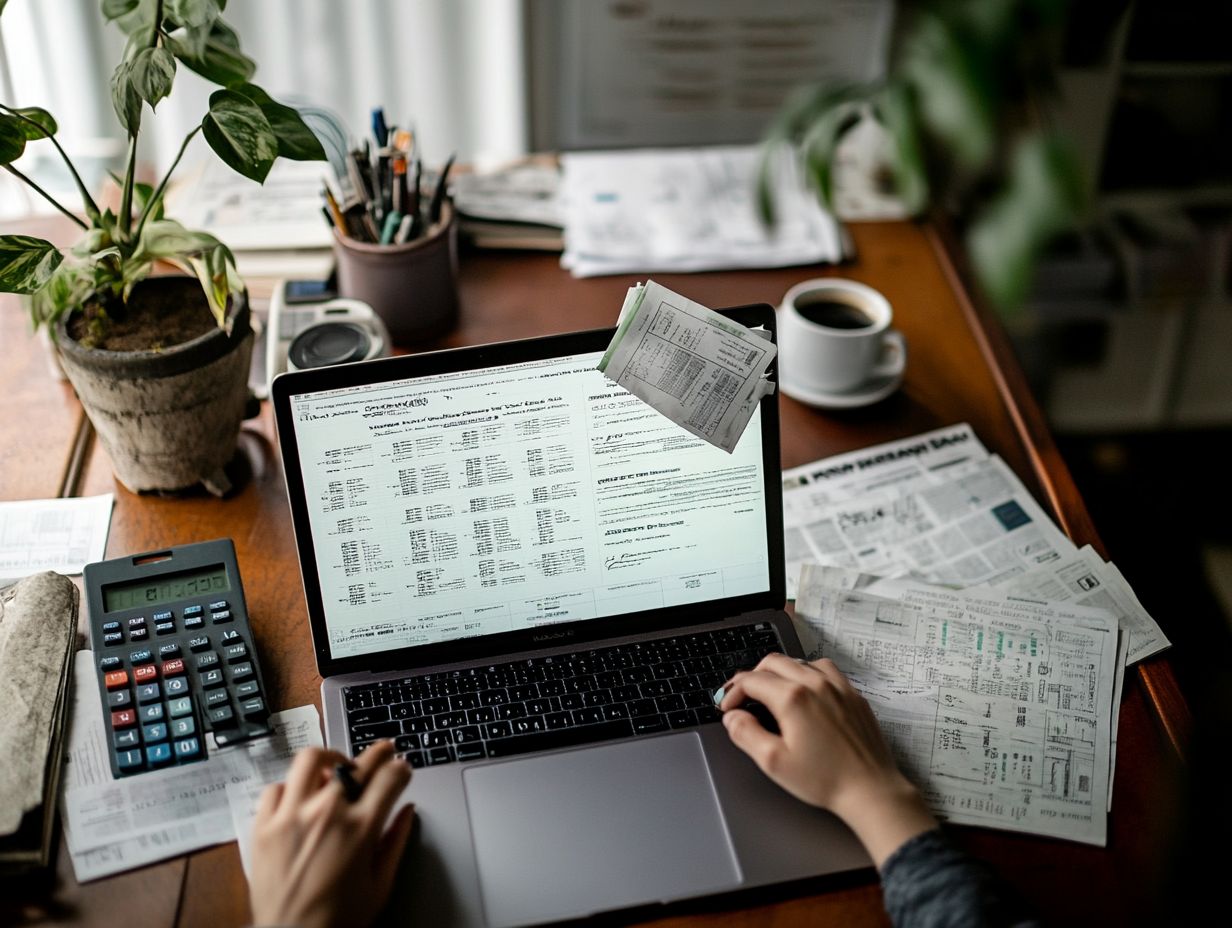What Is the Best Way to Cut Unnecessary Expenses?
Managing your finances may seem daunting at times, but grasping your expenses is the crucial first step toward achieving financial freedom.
This article will guide you in organizing your spending, helping you distinguish between necessities and luxuries. You ll discover practical steps to establish a realistic budget, effective strategies for trimming unnecessary costs, and insightful tips to maximize savings on essentials.
This discussion emphasizes tracking your progress and making necessary adjustments along the journey.
Are you prepared to seize control of your finances? Let s dive in!
Contents
Key Takeaways:

- Understand where your money goes by organizing your expenses. This helps you see the bigger picture.
- Differentiating between what you need and what you want will help you prioritize and cut unnecessary costs.
- Set a budget that works for you by tracking your spending and setting simple goals. Check your progress regularly to stay on track.
Understanding Your Expenses
Understanding your expenses is an essential step toward achieving financial stability and reaching long-term goals, like retirement. By examining your home expenses, including your mortgage and HOA fees, you can pinpoint areas where you can trim spending and save money.
This insight gives you the power to craft a budget that aligns with your priorities, allowing you to manage your cash flow more effectively and confidently.
Identifying and Categorizing Expenses
Identifying and organizing your expenses is vital for gaining a clear understanding of your money situation, giving you the power to track your spending effectively and make informed decisions.
To manage both fixed expenses, like your mortgage or HOA fees, and variable costs such as groceries, adopting a systematic approach can be incredibly beneficial. Consider utilizing budgeting apps that offer easy categorization and real-time tracking, streamlining the entire process.
If you prefer a more hands-on method, creating spreadsheets can also be a powerful tool, allowing you to customize categories and visualize your spending patterns over time.
For example, by separating fixed costs from variable ones, you can gain insight into where the bulk of your income is directed. These strategies not only enhance your awareness but also enable you to make smarter financial choices as you move forward.
Assessing Necessities vs. Luxuries
Assessing what you truly need versus what you desire is an essential practice for grasping your spending habits and deciding how to allocate your resources wisely. By examining essential expenses think groceries and rent against non-essential indulgences, such as streaming subscriptions like Netflix or Hulu, you can uncover valuable insights.
You ll discover areas where cutting back can save you a lot of money! Ultimately, this evaluation sets the stage for a more sustainable financial future, giving you the power to take control of your finances.
Determining Essential vs. Non-Essential Expenses
Determining which expenses are essential versus non-essential requires a thorough examination of your spending habits. You need to pinpoint the costs that are unavoidable and those that can be minimized or eliminated.
For example, expenses like insurance and dog food are crucial for maintaining health and safety, while treating yourself to gourmet coffee or frequent outings for entertainment might not be vital for your survival. By categorizing these expenditures, you can gain clarity on where to cut back.
A practical approach to reassessing your financial situation could involve implementing a spending freeze for a month. This pause allows you to evaluate your purchases and discover what truly adds value to your life.
Over time, this discipline can cultivate more mindful spending habits, ultimately freeing up resources for investments that make a meaningful impact.
Creating a Budget

Creating a budget is a crucial step in managing your finances. It helps you spend your money wisely, track your expenses, and work toward your financial goals.
By leveraging tools like EveryDollar, you can craft a budget that aligns with your priorities. Integrating strategies, such as a spending freeze, will help you rein in unnecessary expenses.
Establishing a budget fosters accountability and lays the foundation for long-term financial well-being.
Steps to Creating a Realistic Budget
To create a realistic budget, start by assessing your total income and outlining your fixed expenses, such as mortgage payments and groceries. Don t forget to factor in variable costs like entertainment and dining out.
This thorough evaluation will give you a clear picture of your financial landscape. Next, categorize your income sources whether it s your salary, side gigs, or investments and compare that with your spending.
Encourage a systematic approach by breaking down your expenses into essential categories like utilities, transportation, and discretionary spending. For effective tracking, consider using budgeting apps or maintaining a dedicated notebook to record your daily expenses.
This can be particularly insightful if you’re using credit cards, as it allows you to easily review your purchases and ensure they align with your budget. This helps you maintain financial discipline.
Strategies for Cutting Expenses
Cutting expenses boosts your ability to save money and manage your budget effectively. By making conscious choices like opting for generic brands, planning your meals, and taking full advantage of BOGO coupons you can significantly reduce your overall spending while maintaining quality.
Habits like brewing your coffee at home or preparing a brown-bag lunch can lead to substantial savings over time. This allows you to enjoy a more financially secure lifestyle.
Ways to Reduce or Eliminate Non-Essential Expenses
Reducing or even eliminating non-essential expenses is crucial for cultivating a healthier financial landscape. This shift allows you to redirect funds toward what truly matters be it essential needs or savings.
Take a moment to scrutinize your subscription services. By pausing those you barely use, you can uncover cash flow that might otherwise slip through your fingers. Evaluating your television options is also a savvy move.
Instead of shelling out for pricey cable packages, consider alternative streaming services that offer similar entertainment at a much more reasonable price. In terms of social activities, let your creativity shine.
- Picnics in the park
- Movie nights at home
- Exploring local hiking trails
These options demonstrate that enjoyment and connection can flourish without the burden of financial strain. Embracing simpler activities not only saves you money but also deepens your relationships.
Maximizing Savings
Maximizing your savings is crucial for reaching your long-term financial goals, especially when managing essential expenses. By embracing practices such as investing in reusable items or choosing to buy used instead of new, you can conserve your finances while fulfilling your needs.
These thoughtful strategies will greatly enhance your overall financial health and stability, setting you on a path to success.
Start your budgeting journey today and take control of your finances!
Tips for Saving Money on Essential Expenses

Saving money on essential expenses like groceries and utilities can greatly impact your budget. This allows you to allocate funds to other financial priorities.
By embracing practical strategies such as meal planning, you can cut down on your grocery bills while maintaining a balanced diet. Taking the time to outline your meals for the week helps you avoid last-minute takeout temptations and encourages smarter shopping choices.
Investing in energy-efficient appliances is a savvy move that can lead to substantial savings over time. Simple upgrades like switching to LED light bulbs or installing programmable thermostats create long-term reductions in your utility expenses.
Get creative with DIY home improvement projects! They can save you money and improve your home’s comfort and value. Projects like weatherproofing your windows or starting a garden are great examples.
Tracking Progress and Adjusting
Tracking your progress and fine-tuning your budgeting strategy is essential for reaching your financial goals. This keeps you aligned with your desired outcomes.
By regularly reviewing your expenses and assessing subscriptions or other non-essentials, you empower yourself to make informed choices that resonate with your budget. You can also try pausing your spending during tough times for valuable clarity.
Monitoring Expenses and Making Changes as Needed
Monitoring your expenses and adjusting your budget is crucial for maintaining financial discipline. This helps you adapt to shifting circumstances.
You can also use a variety of techniques and tools that simplify tracking while enhancing your financial awareness. Budgeting apps like Mint or YNAB provide a clear overview of your income and expenditures.
Alternatively, maintaining a straightforward spreadsheet can be an effective way to log your daily expenses. Regularly reviewing these records encourages you to assess your financial priorities and adjust your budget proactively.
Frequently Asked Questions
What is the best way to cut unnecessary expenses?
The best way to cut unnecessary expenses is to identify all your current expenses and categorize them into essential and non-essential categories. Then, prioritize which non-essential expenses can be reduced or eliminated.
How can I identify unnecessary expenses?

To identify unnecessary expenses, track your spending for a month and review your bank and credit card statements. Look for any recurring expenses or impulse purchases that can be cut or reduced.
What are some common unnecessary expenses?
Common unnecessary expenses include subscription services, frequent dining out, and regular purchases of new clothes or gadgets. Overspending on groceries or entertainment also falls into this category.
Should I cut all non-essential expenses?
No, you don’t need to cut all non-essential expenses. It’s important to find a balance between saving money and maintaining a reasonable quality of life.
Are there any alternatives to cutting expenses?
Yes, you can look for ways to increase your income. This might include picking up a side hustle, negotiating a raise at work, or selling unused items to offset necessary expenses that cannot be cut.
How often should I review and adjust my expenses?
It is recommended to review and adjust your expenses at least once a month. This helps you stay on track with your budget and make necessary changes as your financial situation evolves.






